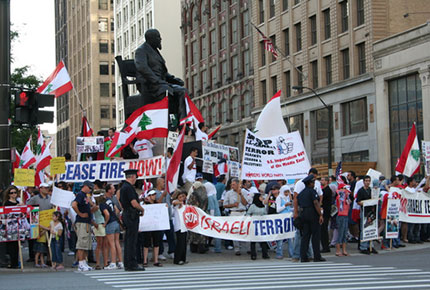How engaged and effective is the Lebanese diaspora in Lebanon’s politics?
Assistant Professor of Political Science Jennifer Skulte-Ouaiss reveals the findings of a study involving over 350 Lebanese living abroad.
How active are members of the Lebanese diaspora in the development and politics of Lebanon? In search of the answer, LAU’s Associate Professor of sociology and anthropology Paul Tabar and Assistant Professor of political science and international affairs Jennifer Skulte-Ouaiss spent many months interviewing over 350 Lebanese people living abroad who self-identify as highly engaged with their home country. This year, they published their findings in the journal Immigrants & Minorities.
Skulte-Ouaiss, who with Tabar and other LAU faculty members make up the university’s Institute for Migration Studies, talks us through the motivation, main findings and conclusions of the study.
What was the motivation behind this research?
Quite simply, we wanted to see whether the perception of the Lebanese diaspora as rich and powerful is warranted. The diaspora consists of at least six million people — including Lebanese who live abroad but maintain active roots and links to the country. So we wanted to see how they use their wealth — be it of money, ideas, connections or experience — and tie it back to Lebanon through political development and channels.
You interviewed over 350 diasporans in Australia, the U.S. and Canada who believe themselves to be highly engaged. How do the different diaspora communities compare?
We conducted in-depth interviews as opposed to surveys, so our data is qualitative and very rich, but it does make comparison somewhat more difficult. We wanted to make sure we interviewed a diverse cross-section of the diaspora population, in order to represent the dynamic demographic of Lebanon.
A general knowledge of the history of migration from Lebanon helped us locate people from specific communities or sects. Orthodox Christians, for example, can be found in Montreal, while the nexus of Muslim Lebanese in the U.S. is Detroit. For the most part, however, Lebanese communities in the U.S. are spread out, while those in Australia can mostly be found in Sydney. This explains why a number of village associations have been established in Australia but not in the U.S.
Lebanese immigrants in all three countries can hold dual citizenship, and for the most part their host countries do not set limitations on their engagement with their home country. The clear exception is support for Hizbollah, considered a terrorist organization. That said, a lot of money is still gathered to support the party’s engagement with orphans, education and military activities.
Do most émigrés support development in Lebanon through affiliated political parties?
Not all, but those who want to effect change at a political or national level do find that political entities, divided along sectarian lines, are the only mechanisms through which to do so. That is why many choose to support small-scale initiatives in their hometowns, where they can see a measurable impact. But those concerned with macro-level change find few avenues beyond the established sectarian parties. They live in countries that are receptive to politically engaged citizens and heighten the ability of would-be activists to engage, but when they try to apply the same concepts or approaches to Lebanon, their actions can be lost in translation.
In any case, we’re talking about a small minority. Lebanese in Canada, the U.S. and Australia are encouraged to integrate, so over time their connection with Lebanon becomes simply cultural and less concrete or political. This contrasts with Lebanese who live in the Gulf where integration is blocked and so their roots remain strong.
The conclusion seems to be that diaspora communities do not have much impact on the political development of Lebanon. Might that change over time?
Lebanese diasporans can influence the outcome of local elections in Lebanon and have been used to do so, but for the most part their impact is small. If they are to really effect change they need to focus more on a macro level, but Lebanon is just so diffuse that it’s logical that the diaspora does things locally, based on pre-existing relationships.
A dramatic shift in the landscape in Lebanon may encourage or invite strong, experienced émigrés to return and rebuild political structures and institutions, as happened in the Baltic states after the fall of the Soviet Union, but no such dramatic shift has occurred so far, not even with the end of the civil war. If it does, there are plenty of highly qualified and experienced people willing and able to politically engage in Lebanon.
More
Latest Stories
- Into the Psychology of Justice
- Alumnus Zak Kassas on Navigation, Spoofing and the Future of GPS
- Hearing Between the Lines
- LAU Hematology Conference 2025: Advancing Science Through Interdisciplinary Exchange
- Dr. Chaouki T. Abdallah Invested as LAU’s 10th President
- LAU Guides Its Students Through the Code of Conduct
- Innovative Procedure at LAU Medical Center–Rizk Hospital Signals Hope for a Patient With a Congenital Disease
- LAU’s Inaugural PodChat Session Addresses AI Detection in the Classroom


